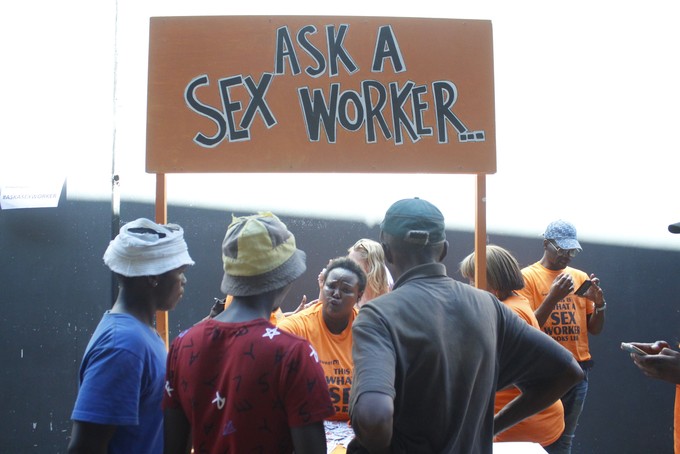“What would you do if your sister was a sex worker?”
The bright orange stand with the words “Ask a Sex Worker” written across it is not a familiar sight in the Bellville taxi rank, or anywhere else for that matter. But today, commuters stop and pick up condoms, lubricant and pamphlets displayed on the table, looking inquisitively at the women and men in shirts stating “This is what a sex worker looks like”.
“What would you do if your sister said she had been a sex worker for many years?” Duduzile Dlamini an organiser for Sisonke Sex Workers Movement (Sisonke) asks a young man who has come to see what the stand is all about.
“I would sit and talk to her and discuss where she needs support,” responds the man to a beaming Dlamini.
The stand has been erected by Sex Workers Education and Advocacy Taskforce (SWEAT) on International Sex Worker Rights Day to inform people about sex workers’ rights and is part of SWEAT’s campaign to decriminalise sex work.
Angeline de Bruin, a team leader for SWEAT’s outreach and development programme, says that if sex work is decriminalised sex workers will feel free to do their job and will be able to report rape and assault cases.
“They will be able to report brutalisation, police harassment, client abuse, as well as discrimination from the community and health facilities,” she says.
“Sex workers are human beings just like any of us,” says de Bruin, calling for the whole country to support decriminalisation.
As people walk up to the stand, Dlamini asks them questions such as “What does a sex worker look like?” and “Does a sex worker deserve to be raped or killed?”
Dlamini explains to the passers-by what decriminalisation is and tries to counter stereotypes about sex workers.
She says she had to explain to a concerned elderly woman that if sex work was decriminalised, trafficking and underage sex work would be controlled and sex workers could report suspicious behaviour.
Patricia Manxiwa, an activist at SWEAT, also explains to a young woman that sex work is a job and that sex workers “buy school uniforms and pay rent” with their income.
Today the Asijiki Coalition for the Decriminalisation of Sex Work, which is a partnership between SWEAT, Sisonke, the Women’s Legal Centre and Sonke Gender Justice, released a statement calling for the immediate release of the South African Law Reform Commission’s report on ‘Adult Prostitution’, swift justice in response to sex workers who are the victims of abuse and murder, an immediate stop to police harassment and abuse, and increased access to sex-worker friendly and non-discriminatory health care.
De Bruin says that they “have been waiting so long for the law reform paper” adding that all they get are “empty promises”. She hopes that the paper will recommend the decriminalisation of sex work.
“It has been more than 15 years and government has not made any recommendations on how the laws on sex work should be reformed,” the Asijiki statement says.
Violence against sex workers is widespread, with Asijiki reporting that just last month three sex workers were shot in Eastern Cape, two fatally.
“Also in February, a female sex worker was found strangled and stabbed to death in Nelspruit. She was last seen … with a client,” Asijiki states.
Sex worker activist organisations believe that the decriminalisation of sex work will help prevent abuse of sex workers and enable them to access public services, such as health-care, more easily.
Support independent journalism
Donate using Payfast

Don't miss out on the latest news
We respect your privacy, and promise we won't spam you.
Next: Province agrees to discuss future of Tafelberg School
Previous: Schools suffer while Eastern Cape fails to spend education budget
© 2016 GroundUp. 
This article is licensed under a Creative Commons Attribution-NoDerivatives 4.0 International License.

